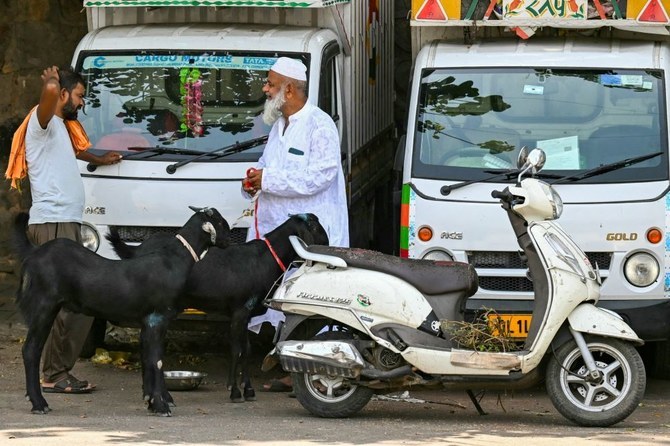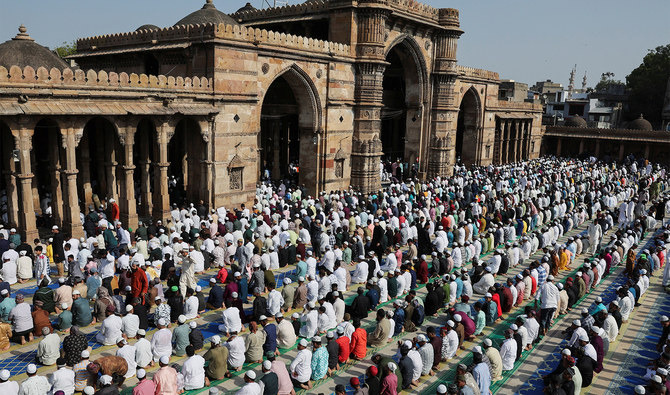NEW DELHI: Indian Muslims and Hindus celebrated Eid Al-Adha on Monday in the spirit of togetherness, as they shared meals to mark the Feast of Sacrifice.
With over 200 million people professing Islam, Hindu-majority India has the world’s largest Muslim-minority population.
Indian Muslims joined in communal prayers across the country on Monday to start their celebrations of Eid Al-Adha, the second of the two main holidays observed in Islam.
“Eid is the most sacred festival for us. The day starts with morning prayer in the mosque nearby, then we prepare the sacrifice of the goat,” Mohammed Altaf, who lives in Delhi, told Arab News.
Eid Al-Adha commemorates the Prophet Ibrahim’s test of faith when he was commanded by God to sacrifice his son. To reflect his readiness to do so, Muslims around the world slaughter an animal, usually a goat, sheep or cow, and distribute the meat among relatives and the poor.
The holiday is also a time of unity and togetherness for Muslims, with many looking forward to spending the day with friends of different faiths.
“I cherish (welcoming) my Hindu neighbors to my home when they come for a special meal,” Altaf said. “I live in a mixed-housing society, and it has been custom for many years to invite my Hindu friends from the community and outside to partake in the food that we prepare on this special occasion.”
Altaf’s household usually makes several preparations of mutton and at least one sweet dish to serve the guests.
“Not only that, we distribute the raw meat of the sacrificed animals to our relatives and Hindu friends, too. This meat is very sacred, and everyone understands that,” he added.
Indian Muslims have faced increasing discrimination and challenges in the past decade, accompanied by tensions and riots ignited by the majoritarian policies of the Hindu right-wing Bharatiya Janata Party, which rose to power in 2014.
Despite incidents of communal violence, Altaf believes that there are people “who know the value of celebrating the festival together,” in order to keep “the secular spirit of India alive.”
The spirit of togetherness binds India’s diverse communities, said Naser Khan, a resident of Malerkotla city in Punjab.
“Eid Al-Adha means happiness … This is a very pure festival, and we celebrate it with lots of joy,” Khan said.
“In India, Eid is not a one-religion festival. Here, people from all faiths participate in each other’s festivals. On Eid, we invite our Hindu and Sikh friends to dine with us and partake whatever we prepare. It becomes an occasion to assert our sense of community and strengthen our communal bonding.”
Prof. Espita Halder, a Hindu woman from Kolkata, was also joining the festivities with her Muslim friends this Eid.
“We need to create a narrative of harmony. People come close to each other during this festival,” she said.
Meha Dhondiyal, another Hindu woman based in Lucknow, said Eid has always been “a part of our lives.” She learned the tradition of joining Eid feasts from her father and has since carried it forward with her own Muslim friends.
“A nation that celebrates together stays together. Festivals are not only religious but of shared culture. And it makes us happy to celebrate Diwali and Holi festivals with Muslim friends,” Dhondiyal told Arab News.
“It’s also important that in this time of provoked hate due to politics, we keep alive the real alternate narrative of harmony and togetherness. It’s the best way we can think of telling our Muslim friends that they’re not alone. We are together.”
























